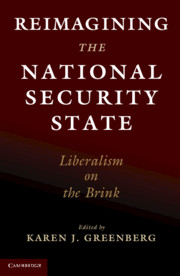Book contents
- Reimagining The National Security State
- Reimagining The National Security State
- Copyright page
- Contents
- Contributors
- Foreword
- Acknowledgments
- A Note from the Editor
- Part I The National Security State in Perspective
- Part II Tracking the Decline of Liberalism
- Part III The Future Imagined
- 9 Beyond the Counterinsurgency Paradigm of Governing: Letting Go of Prediction and the Illusion of an Internal Enemy
- 10 Reestablishing the Rule of Law as National Security
- 11 Rethinking the National Security State from an Evolutionary Perspective: A Reconnaissance
- After Thought
- Notes
- Select Bibliography
- Index
10 - Reestablishing the Rule of Law as National Security
from Part III - The Future Imagined
Published online by Cambridge University Press: 25 October 2019
- Reimagining The National Security State
- Reimagining The National Security State
- Copyright page
- Contents
- Contributors
- Foreword
- Acknowledgments
- A Note from the Editor
- Part I The National Security State in Perspective
- Part II Tracking the Decline of Liberalism
- Part III The Future Imagined
- 9 Beyond the Counterinsurgency Paradigm of Governing: Letting Go of Prediction and the Illusion of an Internal Enemy
- 10 Reestablishing the Rule of Law as National Security
- 11 Rethinking the National Security State from an Evolutionary Perspective: A Reconnaissance
- After Thought
- Notes
- Select Bibliography
- Index
Summary
Mary Ellen O'Connell explores how America’s identify has been linked to its respect for the rule of law and how that relationship has been challenged, particulary since the end of the Cold War. She argues that law is considered sovereign in the United States. The American identity is based on a view of America where DNA is law–national and international. Accordingly, the definition of American security rests upon securing the rule of law. This fundamental principle has been challenged at various points in US history but perhaps never as much as in recent times, beginning with the end of the Cold War. Without an opponent embracing authoritarian rule to reflect against, the post–Cold War confidence in military power overwhelmed the commitment to law. Weakened for a decade, the high commitment to law essentially collapsed on 9/11. It has yet to be regained. With the presidency of Donald Trump, the rise of China, the existential threat of climate change, and other factors, now is the moment to reestablish the place of law as the purpose of US national security.
- Type
- Chapter
- Information
- Reimagining the National Security StateLiberalism on the Brink, pp. 154 - 168Publisher: Cambridge University PressPrint publication year: 2019
- 1
- Cited by

